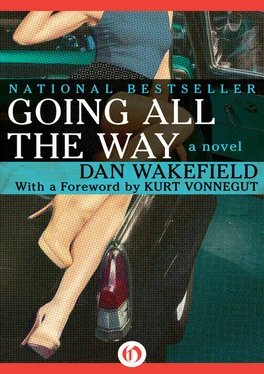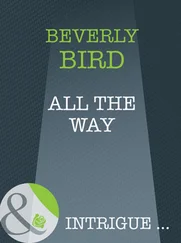The block that Shawl lived on was still not all one color or the other. The colored were there, though, you could see it because they sat around on their porches, the way the colored do. It was the way they had of sitting around on their porches that seemed to annoy many white people, as if they did it in some colored sort of way that made whites cluck their tongues and say, “Look at them, sitting around on their porches,” like there was something wrong about the way they did it.
Right next to Shawl’s place there was a porch full of colored people, kids and grown men and old ladies, all mixed up together, sitting around talking and being colored. Sonny didn’t look straight at them, but he tried to smile, sort of at an angle, hoping to show them he was friendly and supported the Supreme Court Decision, so they would be less likely to slit his throat with a gleaming razor. He had grown up hearing how niggers would just as soon slit your throat with a razor as look at you, and though he had learned in college there were many educated colored who didn’t do that stuff, the razor thing always came to his mind when he saw one.
Shawl lived on the ground floor of a rickety old duplex badly in need of paint, and rented the upstairs out to students. As soon as Sonny walked in, he knew he had worn the wrong thing because nobody else had on a coat or jacket, everyone was much less formal than that.
Sonny hung around inside the door, afraid to plunge on in, but luckily Gunner spotted him and came right over. Gunner, of course, was dressed just right for the occasion, wearing his go-ahead sandals, a rumpled khaki shirt with the sleeves rolled up, and a pair of faded blue jeans that even had some splotches of paint on them. Already. You’d have thought old Gunner was born with an easel in his mitt.
Gunner looked Sonny over real quickly, probably wondering what the hell he was doing in a goddam cowboy shirt, but he didn’t mention anything about it. He led Sonny to the kitchen, which was pretty moldy-looking. There was an old table with no cloth on it, and some gallons of wine, a few stacks of paper cups, and a giant box of Cheez-Its. There was a big old washtub on the floor with ice and beer in it, but Sonny said he’d like some wine. He figured that was more of an artistic kind of drink than beer. Gunner poured him a Dixie cup full of what looked like some dago red.
They went out to what must be the living room, though it didn’t have any furniture except for a couple Salvation Army chairs and a kind of mattress on the floor with a bedspread over it that people were sitting on. Gunner told Sonny he wanted him to meet the host, and Sonny glanced around the room, looking for some tall, gaunt guy with haunted, artistic eyes. Gunner couldn’t seem to spot him either, although there were only ten or so people in the room, but then there was a new, strange sound, a mechanical kind of whirring noise, and a guy buzzed into the room riding a motorized wheelchair. He was a neat, serious-looking guy who had evidently had one of those diseases that leaves your arms and legs as thin as curtain rods and pretty near useless. When Gunner introduced Sonny, Shawl just nodded and gave him the once-over with an expression Sonny hoped was a smile but looked much closer to a sneer.
“Join the festivities,” he said, then whirred away, back toward the kitchen.
“Shawl is pretty cynical,” Gunner said.
“I can understand.”
Marty was there in a pair of her skin-hugging toreadors and a low-cut blouse knotted at the waist. She was sitting cross-legged on the floor with her shoes off, wiggling one foot in time to the music. It was a record of a guy singing and playing the guitar, but it wasn’t hillbilly music exactly. It sounded to Sonny more like old English folk songs but it was about America. Something about This land is your land, and it’s my land.… The words seemed a little communistic.
Marty smiled and nodded at Sonny but didn’t interrupt her foot-wiggling concentration on the music. Sonny tried bobbing his head a little to the rhythm and looked around the room. There were four or five guys, most of them older-looking, and only two other girls besides Marty. One of them wasn’t really a girl but an older woman around thirty-five or so. She sat on a chair in a corner all by herself, sipping a Dixie cup of wine and staring at nothing special. She was the only person sitting in a chair, unless you counted Shawl in his mobilized wheelchair. The only other female was a fairly young, arty-looking girl wearing sandals and Levi’s and a man’s white shirt. Her hair was long but more stringy than sleek, and to put it most generously the girl was rather hefty. The ravishing girl that Sonny had counted on seeing across the crowded room wasn’t anywhere to be seen. He should have brought Buddie after all.
It didn’t take long to finish the wine in the Dixie cup, and Sonny went to the kitchen for a refill. He got talking to a tall, skinny guy with glasses named Donald Hoskins, who was a real painter, although he taught art to support himself. Unless you were great like Picasso or somebody, that’s what you had to do to make a living, if you were an artist. Hoping he didn’t sound stupid, Sonny asked Hoskins how people got to see his paintings.
“You have a show,” he said.
“Where do you have it?”
“Well, anyplace you can. In an art gallery, mostly. I had one last year in New York. In an art gallery there.”
“Hey, that’s great. New York.”
Hoskins smiled rather painfully. “I guess it’s nice to have had it,” he said.
“Did you sell a lot of your paintings?”
“Two—or one, really. Maybe you could call it one and a half.”
Sonny wasn’t sure if the guy was pulling his leg. “Can you sell half a painting?” he asked.
“No, not actually. What happened was, one painting was bought by a cousin of my mother who lives in New Jersey. Another one wasn’t exactly bought by anyone, but it was damaged when the paintings were shipped back and I collected insurance on it.”
“Oh.”
“I did get paid for it, anyway.”
“Well, that’s something.”
Hoskins shrugged. He didn’t look bitter, just sad. Sonny couldn’t think of anything consoling to say, and he eased out of the kitchen, wandering back to the living room. There was a smaller room off of it that was full of books and magazines and papers. Sonny didn’t exactly mean to peek in on Shawl’s private stuff, but he couldn’t help noticing that some of the magazines were those little egghead weeklies that were printed on rough paper and didn’t have any pictures on the covers, just names of articles. Magazines that looked like that were usually pretty pinko, and Sonny wondered if maybe Shawl was actually a Commie. They said it was people who were bitter and down on everything who joined the Commies, and God knows Shawl had a right to feel that way. Maybe the whole place was a secret communist cell; with the magazines and the folk music and everything, that’s about all you’d need. It was hard to tell, though, and Sonny was kind of ashamed of himself for being suspicious. Jesus, there were even some friends of his mother who thought he was one, so he shouldn’t go around suspecting other people, not unless he really had the goods on them.… Even then you didn’t always know. McCarthy claimed to have the goods on all kinds of people, but other real proven Americans, even United States Senators, said he was full of baloney.
Sonny went back and sat down beside Gunner. There was a cool jazz record on now, one of the ones with a soft, moany trumpet, and Marty had her eyes closed, all absorbed in the music. Sonny asked Gunner in a whisper, “Is Shawl an artist himself?”
“No, he works on the Times . He edits stuff, on the copy desk.”
Читать дальше












